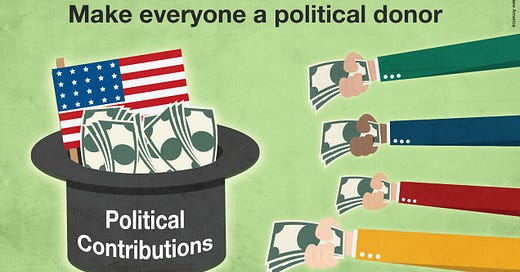Let's Get More Money in Politics
If you ask someone—especially someone on the political left—about money in politics, they'll often say that there's far too much of it. It's one of those assertions repeated so often that people take it as self-evident and there’s no need to justify it. But is the issue the amount of money, or who controls it and how it’s spent?
Note: I found this piece I had written long ago and thought it was worth adding to the blog. The references are old but the idea still seems relevant.
I think the genesis of the “too-much-money” argument is the concern that special interests and wealthy people have too much influence in our current system. So it is natural to counter that by restricting how much money they could spend. But I don’t think that’s the only way to solve the problem.
I think we should ask, “How much money is the right amount?” The 2008 congressional and presidential election cost, in total, about $5.3 billion. Was this a good deal? Well, I think that comes down to a couple of questions. What's the value of having the right president, and does more money produce a better candidate? Let's start with the second question which the answer to it is, of course, "it depends". It depends on how that money is spent and who is spending it. But I think it’s entirely reasonable to believe that more funding, if well-spent, could result in a more knowledgeable electorate. This more knowledgeable electorate would, presumably, select better representatives.
What if we gave every American “Democracy Bucks” that they could only spend on the election? Giving all 300 million Americans $100 Democracy Bucks each would cost a total of $30 billion. At this amount, the total value of the Democracy Bucks would drown out the voices of even the wealthiest people and special interests. $30 billion is a lot of money; I don’t mean to downplay this. But what's the value of having the right representatives? Well, in 2009 the federal budget was about $3 trillion. If better representatives made the budget only 1% more effective, the Democracy Bucks would pay for themselves.
And, to be clear, the federal budget is a tiny fraction of the total number of hugely important decisions our representatives make. They set trade and immigration policies, declare war and peace, and set the course of the nation. I'm focusing on the budget because it's easily quantifiable, not because it's most important. So, given the potential upside, I think we should question whether there's "too much money in politics," but instead start thinking about if we should add more.



